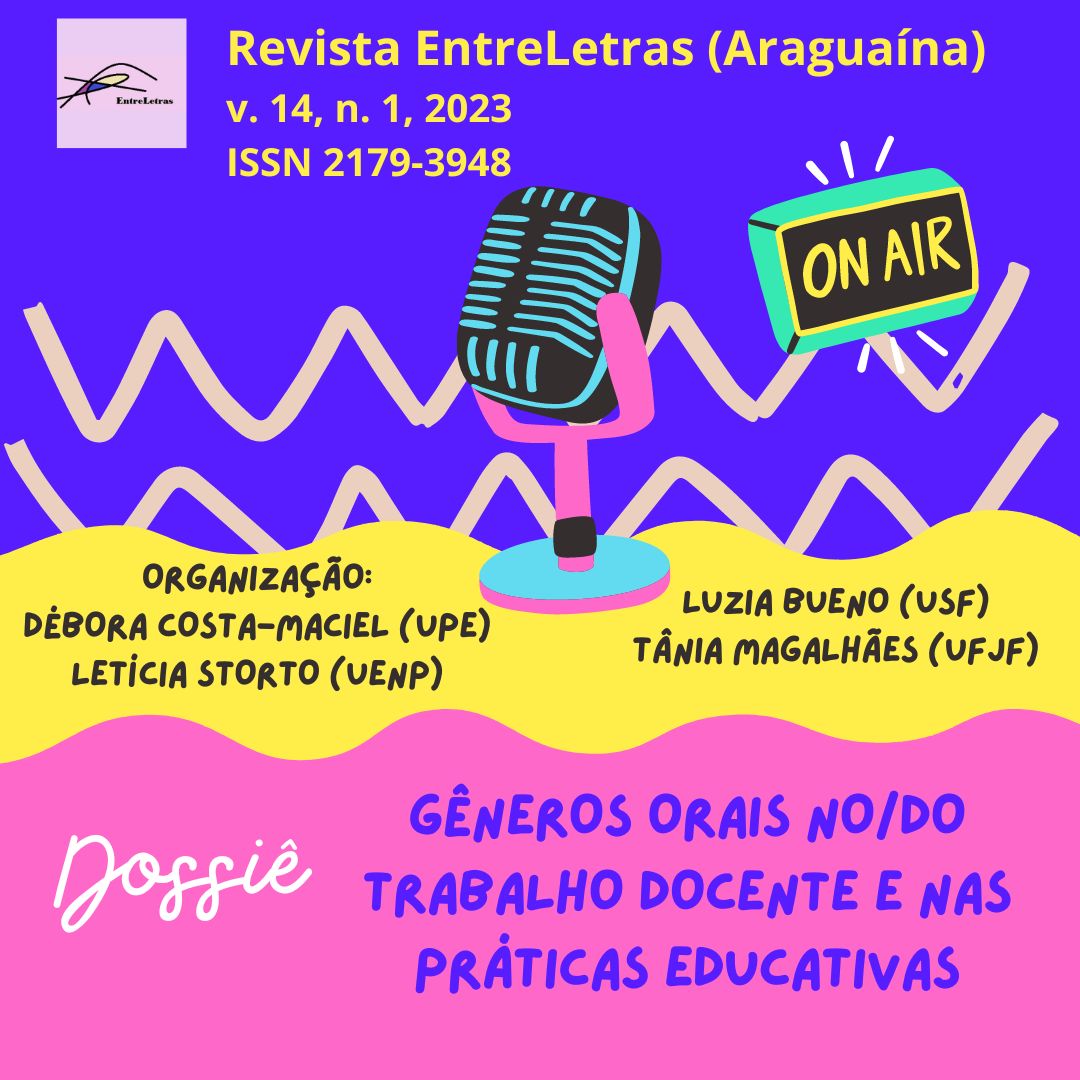OVERVIEW OF THE DISCOURSE GENRES THAT CONSTITUTE THE TEACHING METIER AND PROPOSAL FOR TEACHING AN ORAL GENRE
DOI:
https://doi.org/10.20873/uft2179-3948.2023v14n1p6-23Keywords:
teaching métier, professional discourse genres, orality, appreciation of the teacher's work.Abstract
This paper representes a conclution a series of four exploratory studies, carried out with the intention of inventorying the discourse genres that constitute the teaching métier. In this text, our goals are mainly to make a panoramic presentation of the genres of professional teaching discourse, to gather some concepts and categories which are essential for the organization and analysis of the research corpus, some of which were built in the trajectory of this study, we also aim to advance towards a set of oral genres mobilized for the teacher's work, focusing on a contextualized teaching and learning process. The research finds foundations in sociocultural and dialogical studies, led by Bakhtin (2003), and in studies that associate language and work, such as Clot (2010) and Bathia (1994). The hundreds of genres raised in the previous studies and the adaptations demanded by different contextual realities point out to an unknown work of complexity and volume by the professionals themselves, which contributes to the devaluation of the profession. The study also offers the possibility of teaching and learning oral professional genres, as a path to appropriating ways of saying which are essential to the teaching métier and its valorization.
Downloads
References
BAKHTIN, M. Estética da criação verbal. 4. ed. São Paulo: Martins Fontes, 2003.
BATHIA, V. K. Analysing genre: language use in professional settings. London: Longman, 1994.
BRASILEIRO, A. M. M.; PIMENTA, V. R. Os gêneros do métier docente: a linguagem como instrumentalização do trabalho do professor. DELTA: Documentação e Estudos em Linguística Teórica e Aplicada, [S. l.], v. 37, n. 2, 2021. DOI: https://doi.org/10.1590/1678-460X202149397. Acesso em: 18 mar. 2023.
BRASILEIRO, A. M. M.; PIMENTA, V. R. A formação do professor universitário e a apropriação dos gêneros do métier docente. ALFA: Revista de Linguística, São Paulo, v. 66, 2022a. DOI: 10.1590/1981-5794-e13880. Disponível em: https://periodicos.fclar.unesp.br/alfa/article/view/13880. Acesso em: 18 mar. 2023.
BRASILEIRO, A. M. M.; PIMENTA, V. R. A linguagem como instrumento de trabalho: as atividades do professor no ensino remoto e os gêneros do métier docente. In: CARVALHO et al. (orgs.). Veredas e (re)configurações da formAção docente [livro eletrônico]. Belo Horizonte: Editora UEMG, 2022b. p. 276-303.
BRASILEIRO, A. M. M.; PIMENTA, V. R. Entre o fazer e o pensar sobre o fazer: os gêneros do discurso profissional docente e o trabalho invisível do professor em contexto pandêmico. Revista Interfaces, v. 13, p. 30-47, 2022c. Disponível em: https://revistas.unicentro.br/index.php/revista_interfaces/article/view/7143. Acesso em: 26 fev. 2023.
BRASILEIRO, Ada M. M.; PIMENTA, V. R. The teaching metier in remote environment: expanding and redesigning discursive practices. In: Juliana Alves Assis; Fabiana Komesu; Cédric Fluckiger. (Org.). Práticas discursivas em letramento acadêmico: questões em estudo. 1ed.Belo Horizonte: Puc Minas, 2020, v. 4, p. 441-467.
CASTILHO, A. T. A língua falada no ensino de português. São Paulo: Contexto, 2011.
CLOT, Y. Trabalho e poder de agir. Tradução de Guilherme João de Freitas Teixeira e Marlene Machado Zica Vianna. Belo Horizonte, Fabrecatum, 2010.
KOCH, I. O texto e a construção dos sentidos. São Paulo: Contexto, 1997.
MACHADO, A. R; LOUSADA, E. G. A apropriação de gêneros textuais pelo professor: em direção ao desenvolvimento pessoal e à evolução do "métier". Linguagem em (Dis)curso, v. 10, n. 3, 2010, p. 619-633
MAGALHÃES, T. G.; BUENO, L. ; STORTO, L. J. ; COSTA-MACIEL, D. A. G. Um decálogo para a inserção da oralidade na formação docente. Veredas - Revista de Estudos Linguísticos, v. v. 26, p. 384-413, 2022.
MAGALHÃES, T. G. O texto oral e a sala de aula. JEALP-LALIN. YouTube, 18 de novembro de 2021. Disponível em: encr.pw/vCIpa. Acesso em: 20 mar. 23.
MARCUSCHI, Luiz Antônio. Da fala para a escrita: atividades de retextualização. 4. ed. São Paulo: Cortez, 2003.
MARCUSCHI, Luiz Antônio. Gêneros textuais emergentes no contexto da tecnologia digital. In: MARCUSCHI, Luiz Antônio; XAVIER, Antonio Carlos. Hipertexto e gêneros digitais: novas formas de construção de sentido. 3. ed. São Paulo: Cortez, 2010. p. 15-80. (pdf)
NOUROUDINE, A. A linguagem: dispositivo revelador da complexidade do trabalho. In: SOUZA-E-SILVA, M. C. P. de; FAÏTA, D. (Orgs.). Linguagem e trabalho: construção de objetos de análise no Brasil e na França. São Paulo: Cortez, 2002. p. 17-30.
PIMENTA, V. Textos forenses: um estudo de seus gêneros textuais e sua relevância para o gênero sentença. Dissertação de Mestrado. Universidade Federal de Uberlândia, 2007.
ROJO, R. Pedagogia dos multiletramentos In: ROJO, R.; MOURA, E. (Org.) Multiletramentos na escola. São Paulo: Parábola, 2012.
ROJO, R. H. R.; BARBOSA, J. P. Hipermodernidade, multiletramentos e gêneros discursivos. São Paulo: Parábola Editorial, 2015.
SWALES, J. M. Genre analysis: english in academic and research settings. Cambridge (UK); New York: Cambridge University Press, 1990.
SWALES, J. M. The concept of discourse community: some recent personal history. Composition Forum, 37, Fall, 2021. Disponível em: https://compositionforum.com/issue/37/swales-retrospective.php. Acesso em: 20 mar. 2023.
TRAVAGLIA, L. C. Gêneros orais: conceituação e caracterização. Revista Olhares & Trilhas, v. 19, n. 2, 2017.
Downloads
Published
How to Cite
Issue
Section
License
Copyright (c) 2023 EntreLetras

This work is licensed under a Creative Commons Attribution 4.0 International License.
Os autores mantêm os direitos autorais e concedem à revista o direito de primeira publicação, com o trabalho simultaneamente licenciado sob a Creative Commons 4.0 que permite o compartilhamento do trabalho com reconhecimento da autoria do trabalho e publicação inicial nesta revista.
Os autores têm autorização para assumir contratos adicionais separadamente, para distribuição não-exclusiva da versão do trabalho publicada nesta revista (ex.: publicar em repositório institucional ou como capítulo de livro), com reconhecimento de autoria e publicação inicial nesta revista.










